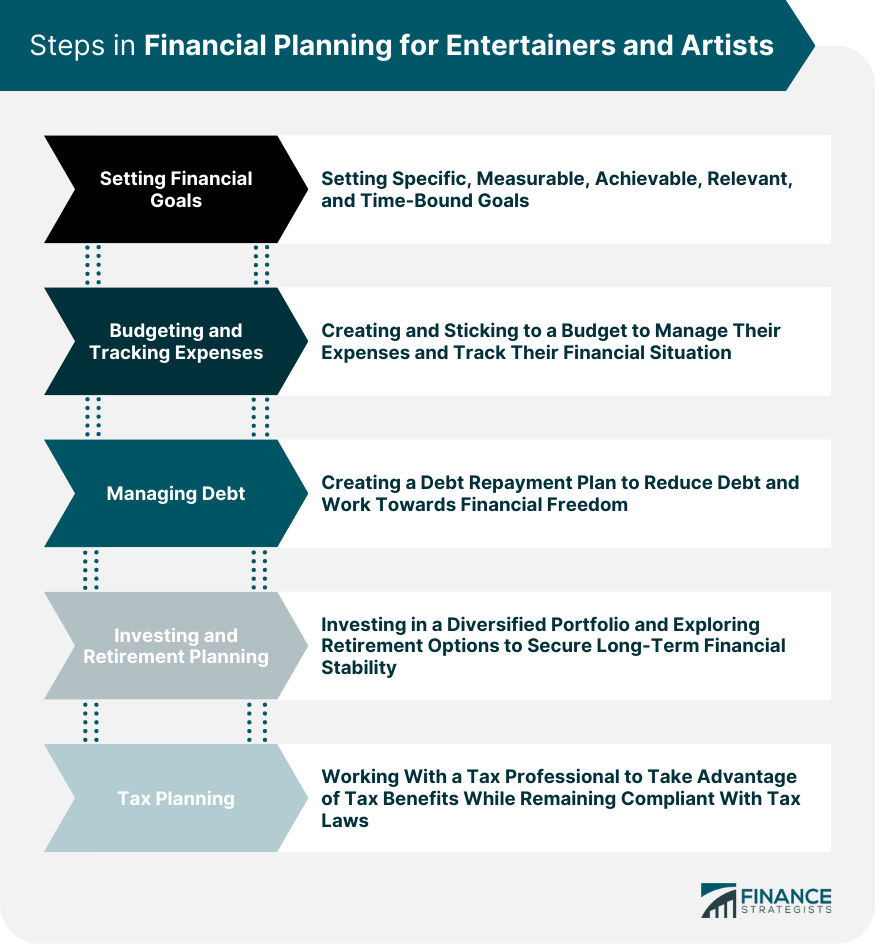Financial planning for entertainers and artists refers to the process of creating a comprehensive financial strategy that meets their unique needs and goals. It involves managing their income, expenses, investments, and taxes in a way that maximizes their financial success and stability. For entertainers and artists, financial planning may involve creating a budget that takes into account their variable income streams, such as royalties, advances, and performance fees. They may also need to plan for periods of unemployment and unexpected expenses, such as equipment repairs or legal fees. Financial planning may also involve investing in their careers, such as funding new projects or obtaining additional training. Additionally, entertainers and artists may need to plan for their retirement and consider options such as setting up a retirement account or investing in real estate.
The entertainment industry includes various sectors, including music, film, television, theater, and art. This industry has a high level of competition, making it challenging for entertainers and artists to earn a steady income. Entertainers and artists have unique earnings and expenses that require a specialized approach to financial planning. Artist earnings can come from various sources, including royalties, merchandise sales, and touring. However, artist expenses, such as equipment, marketing, and touring costs, can quickly add up and impact overall financial stability. Financial planning for entertainers and artists requires a comprehensive understanding of their industry's unique earning and spending patterns. While artist earnings can vary based on factors such as popularity, genre, and performance frequency, some common income sources for entertainers and artists include royalties, merchandise sales, sponsorships, and live performances. On the other hand, artist expenses can also vary widely, including equipment purchases, recording costs, marketing expenses, and touring expenses. It is important to note that these expenses can add up quickly and can easily exceed an artist's income if not managed carefully. Therefore, it is essential for entertainers and artists to work with financial planners who are familiar with the entertainment industry to help them navigate these unique financial challenges and achieve long-term financial stability. The entertainment industry presents unique financial challenges, including inconsistent income, uncertain career prospects, and a high level of competition. These challenges make it essential for entertainers and artists to prioritize financial planning to maintain financial stability during uncertain times. The entertainment industry is notorious for presenting several financial challenges that are distinct from those faced in other industries. One of the most significant financial challenges for entertainers and artists is the inconsistency of income, which can result in unstable finances and difficulty managing cash flow. This is because many artists and entertainers often rely on a range of income sources, such as live performances, royalties, and sponsorships, which can fluctuate based on factors such as popularity, competition, and overall demand. Additionally, many artists and entertainers face uncertain career prospects, with the risk of being dropped by their record label or losing their agent, which can significantly impact their earnings. Furthermore, the entertainment industry is highly competitive, making it essential for artists and entertainers to spend money on marketing, networking, and self-promotion, which can further impact their finances. Therefore, financial planning is essential for entertainers and artists to maintain financial stability, set achievable financial goals, manage their expenses, and plan for the future. By working with financial planners who understand the nuances of the entertainment industry, artists and entertainers can overcome these financial challenges and achieve long-term financial security. The first step in financial planning for entertainers and artists is setting financial goals. These goals should be specific, measurable, achievable, relevant, and time-bound (SMART). Examples of financial goals include saving for retirement, paying off debt, and building an emergency fund. Budgeting and tracking expenses are crucial steps in financial planning for entertainers and artists. By creating and sticking to a budget, entertainers and artists can manage their expenses and have a clear understanding of their financial situation. Tracking expenses can help identify areas for improvement and opportunities for savings. Managing debt is an essential part of financial planning for entertainers and artists. High levels of debt can hinder financial stability and impact long-term financial goals. By creating a debt repayment plan, entertainers and artists can reduce debt and work towards financial freedom. Investing and retirement planning are crucial steps towards long-term financial stability. By investing in a diversified portfolio, entertainers and artists can grow their wealth and secure their financial future. Retirement planning should also be a priority, with entertainers and artists exploring options such as individual retirement accounts (IRAs) and 401(k) plans. Tax planning is an essential part of financial planning for entertainers and artists. The entertainment industry has unique tax implications, including tax deductions for equipment and travel expenses. By working with a tax services professional, entertainers and artists can ensure they are taking advantage of all possible tax benefits while remaining compliant with tax laws. Building a financial team is essential for entertainers and artists to navigate the unique financial challenges of the entertainment industry. A financial team can provide specialized advice and support in areas such as tax planning, investment strategies, and debt management. A financial team for entertainers and artists typically includes a financial advisor, accountant, and lawyer. These professionals can provide specialized expertise in various financial areas, helping entertainers and artists make informed financial decisions. When selecting a financial team, entertainers and artists should consider factors such as experience, credentials, and communication skills. It's important to choose professionals who have experience working with individuals in the entertainment industry and who understand the unique financial challenges that come with it. Maintaining good financial habits is crucial for entertainers and artists to achieve financial stability. These habits include living below your means, saving regularly, and avoiding unnecessary debt. Entertainers and artists should seek professional help when navigating the financial challenges of the entertainment industry. Working with professionals such as financial advisors, accountants, and lawyers can provide specialized expertise and support in areas such as tax planning, investment strategies, and debt management. There are various resources available for entertainers and artists looking to improve their financial literacy and financial stability. These resources include financial education programs, budgeting apps, and online courses. Financial planning for entertainers and artists involves creating a comprehensive strategy that meets their unique financial needs and goals. Understanding the entertainment industry is crucial to develop a specialized approach that maximizes financial success and stability. The industry presents unique challenges such as inconsistent income, uncertain career prospects, and high levels of competition, which require a specialized financial team that can provide specialized advice and support in areas such as tax planning, investment strategies, and debt management. By setting financial goals, creating and sticking to a budget, managing debt, investing, retirement planning, tax planning, and seeking professional help, entertainers and artists can achieve financial stability and secure their financial future. It is essential to prioritize good financial habits, seek professional help, and utilize available resources to improve financial literacy and achieve financial stability. By doing so, entertainers and artists can overcome the unique financial challenges of the entertainment industry and achieve long-term financial success.Definition of Financial Planning for Entertainers and Artists
Understanding the Industry for Entertainers and Artists
Overview of the Entertainment Industry
Understanding Artist Earnings and Expenses
Common Financial Challenges in the Industry
Steps in Financial Planning for Entertainers and Artists
Setting Financial Goals for Entertainers and Artists
Budgeting and Tracking Expenses for Entertainers and Artists
Managing Debt for Entertainers and Artists
Investing and Retirement Planning for Entertainers and Artists
Tax Planning for Entertainers and Artists

Building a Financial Team for Entertainers and Artists
Importance of a Financial Team
Roles of a Financial Team
Tips for Choosing a Financial Team
Additional Financial Tips for Entertainers and Artists
Maintaining Good Financial Habits
Seeking Professional Help
Utilizing Available Resources

Conclusion
Financial Planning for Entertainers and Artists FAQs
Financial planning for entertainers and artists involves creating a strategic plan to manage their finances and meet their financial goals.
Financial planning is important for entertainers and artists as it helps them manage their income, budget for expenses, and plan for their future.
The steps in financial planning for entertainers and artists include setting financial goals, budgeting and tracking expenses, managing debt, investing and retirement planning, and tax planning.
Hiring a financial planner is highly recommended for entertainers and artists as it can help them navigate the unique financial challenges in their industry and make informed decisions.
Entertainers and artists can find resources for financial planning through industry associations, financial education programs, and professional financial planners with experience in the entertainment industry.
True Tamplin is a published author, public speaker, CEO of UpDigital, and founder of Finance Strategists.
True is a Certified Educator in Personal Finance (CEPF®), author of The Handy Financial Ratios Guide, a member of the Society for Advancing Business Editing and Writing, contributes to his financial education site, Finance Strategists, and has spoken to various financial communities such as the CFA Institute, as well as university students like his Alma mater, Biola University, where he received a bachelor of science in business and data analytics.
To learn more about True, visit his personal website or view his author profiles on Amazon, Nasdaq and Forbes.











